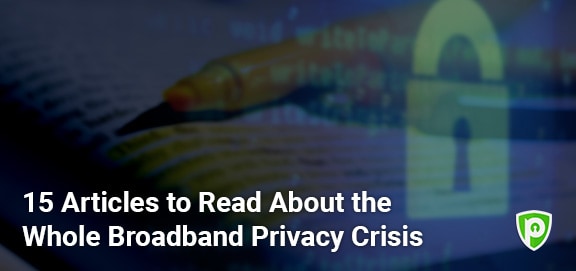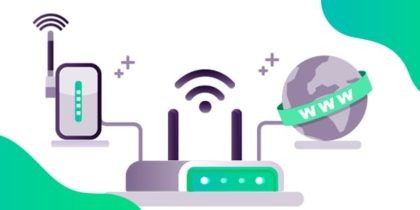Since the Congress repealed previously passed broadband privacy rules, the public remained mostly divided as to whether the repeal is good in their interests or violates their privacy.
Though most Americans are in a rage after the cancellation of Broadband Privacy Rules, there are some who are still neutral and have yet to take sides.
This blog piece is dedicated to these neutrals as it lists out and summarizes multiple articles both supporting and opposing the latest set of rules which have caused broadband crisis across the US.
Before I start listing down articles which take sides to either extremes, let me first help you understand what the points around which the broadband crisis revolves around. The following are some articles which explain in detail the new Broadband Privacy Rules:
#1: Trump signs repeal of U.S. broadband privacy rules
Written by David Shepardson.
David gave an interesting insight regarding the latest Broadband Privacy Rules in his article published on Reuters. He took his time gathering quotes from all entities directly involved in the broadband crisis which include the new FCC Chairman, AjitPai, and ISP companies, like Comcast, Verizon and AT&T.
David pointed out that though the above mentioned ISPs claim that they won’t sell users’ data, they will, however, use customer browsing data for advertising programs including one that uses “aggregate insights that might be useful for advertisers and other businesses.
#2: Congress just killed online privacy rules. Now what? (FAQ)
Written by Marguerite Reardon.
Marguerite wrote an extensive FAQ article which answers almost all of the questions related to the Broadband Privacy crisis. Unlike most other articles published regarding the issue, Marguerite’s article is completely neutral and only lists out all the facts related to the controversy.
Answering important questions like “What’s this mean for me?” and “Is that a bad thing for me?” She also pointed out the solution to all these problems, and that she says is a VPN.
“Your other option is to download VPN software… VPNs, or virtual private networks, provide an alternative route for your online traffic that is hidden from your broadband provider.”
#3: Senate Moves to Permanently Kill the FCC’s Broadband Privacy Rules
Fox News in their article point out all the technicalities related tothe broadband privacy crisis. This includes the technical details of Broadband Privacy Rules approved by the FCC. They also explain how the Congress managed to repeal these rules which only recently was passed into law by the Obama government.
#4: House votes to repeal Obama-era broadband privacy rules
Despite being owned by Comcast, CNBC wrote a fairly neutral article on broadband privacy crisis. They took statements from almost all relevant authorities, except for the ISPs which declined to comment.
One important point they highlighted in their article is the impact of the latest rules on consumers. Quoting Michael Capuano, a Massachusetts Democrat, they pointed out one of the negative impacts of the new privacy rules.
“Just last week I bought underwear on the internet. Why should you know what size I take? Or the color?” Capuano asked. “They are going to sell it to the underwear companies.”
Cons of the latest Privacy Rules:
Like I’ve mentioned above, most people are infuriated after Congress repealed the Broadband Privacy Rules. This anger was seen across various articles published on the web. For your convenience, I’ve picked out some which are the most relevant (and savage!)
#5: Trump smothers broadband privacy in its crib
Written by Lance Ulanoff.
In his article on Mashable, Lance points out all the negative impacts the repealing of Broadband Privacy Rules will produce. He points out that the latest privacy rules mark the end of transparency, choice, breach notifications, and online privacy in general.
“Now, your data can be sold to each and every wolf willing to pay,” says Lance in regards to the Broadband Privacy Rules. “Dissolution of the rules makes ISPs lip-smacking hacker bait.”
#6: Everything you need to know about Congress’ decision to expose your data to internet providers
Written by Devin Coldewey.
Writing for TechCrunch, Devin lists out all the points which make the latest Broadband Privacy Law truly horrible for users’ privacy. Apart from all the negative impacts of these rules, Devin points out one flaw in the whole extravaganza of the passing and then the repealing of Broadband Privacy Law. Quoting him:
“Right now, the FTC is legally barred from regulating ISPs! The FCC’s move in 2015 actually made room for the FTC to step in when problems were happening on the business side of the ISP — for example, price-fixing at a national level. But a recent court decision (which really no one likes, for the record) put ISPs solely in the jurisdiction of the FCC.
“Get it? Both the FCC and the FTC are now barred from making privacy rules for ISPs. There’s no cop on the beat whatsoever!”
#7: Now Those Privacy Rules Are Gone, This Is How ISPs Will Actually Sell Your Personal Data
Written by Thomas Fox-Brewster.
“ISPs = giant advertising networks” is how Thomas describes Internet Providers after the latest Broadband Rules fiasco. Writing for Forbes, he points out that ISPs will now operate like Facebook and Google, and will gather user data with the intent of selling them to advertising agencies. Explaining how they’ll operate, Thomas writes:
“They build substantial datasets on the online activities of certain demographics, say 18 year-olds who spend four hours a day reading about One Direction. They can then tell companies who want to market to those teenagers that thanks to their dataset they know just who to target and how. ISPs take advertisers’ money and place those ads where they go best, on devices and web services they know the consumer uses.”
Pros of the latest Broadband Privacy Rules
Now that you’ve gone through all the bad stuff related to the latest Broadband Privacy Rules, the following are some kinder words which celebrate the latest repeal.
#8: The Downside of the FCC’s New Internet Privacy Rules
Written by Larry Downes.
Larry argues in his article that FCC’s new rules which granted online privacy to consumers were really not necessary. Most data on the web is already hidden because of https encryption, and ISPs couldn’t access your data anyways. Therefore, the new rules were really not necessary.
#9: The Nullification Of FCC’s Broadband Privacy Rules: What It Really Means For Consumers
Written by Washington Legal Foundation.
The foundation argues on Forbes that repealing the rules was necessary in order to grant fairness to Internet Service Providers. They argue that most websites, including Facebook and Google and monitor and use your data anyways, and not granting this flexibility to ISPs was unfair. Therefore, the nullification of these rules was necessary.
#10: Why Congress’s Rejection Of Proposed FCC Data Rules Will Not Affect Your Privacy In The Slightest
Written by Larry Downes.
Larry points out that ISPs were already doing minimal advertising, and were bound by the FCC to not share user data excessively with other companies. Therefore, the nullification was necessary as it produced balance and removed the hassle of creating new and unnecessary rules.
#11: Senate was right to block FCC’s broadband privacy rules
Written by Jonathon Hauenschild.
Jonathon again argues that the new privacy rules didn’t do anything to promote our online privacy. Much of our online communications were already encrypted because of SSTP encryption. And ISPs weren’t really involved in using consumer data for marketing purpose anyways. It’s Facebook and Google which are more actively involved in monitoring and selling users’ online activities.
Conclusion:
After going through the above mentioned extensive debate, we realize that there is something fishy regarding the nullification of the Broadband Privacy Rules. Now that the government is no longer interested in keeping our online privacy intact, we need to bring matters in our own hands.
As you can see from the links below, most experts agree that using a VPN Service is the best solution in this scenario, as it encrypts your online communications and prohibits all kinds of data monitoring, etc.
#12: How to set up a VPN in 10 minutes for free (and why you urgently need one)
Written by Quincy Larson.
Quincy Larson, in his blog piece, explains the importance of using a VPN service, while teaching us how to set one up.
“Well we are not fools. We’re going to take the actions necessary to secure our family’s privacy against the acts of reckless monopolies and their political puppets.” Says Quincy in his article.
#13: The best 3 ways to protect your data after Congress’ repeal of privacy rules
Written by Ben Dickson.
Ben, in his article on The Next Web, explains the importance of encryption in today’s era. Browsing through encrypted websites, using Tor, or subscribing to a VPN service will help in keeping you safe from online data monitoring.
“Virtual Private Networks are services that provide you with a gateway to obfuscate your Internet traffic. VPNs encrypt your entire web traffic and channel it through their own servers,” says Ben. “Your ISP will detect that you’re using a VPN, but will have no access to your data. This includes website domains and other metadata associated with your internet traffic.”
#14: A VPN can stop internet companies from selling your data
Written by Adi Robertson.
In his article on The Verge, Adi points out that a VPN can easily help consumers in the protection of their online activities.
“The right VPN can protect against lots of things, including government surveillance and malware. When you browse the internet, data goes to the server, which passes it securely back to you. When you send data out, it appears to come from the server, not your computer — it obscures what you’re doing online.”
#15: How ISPs can sell your Web history—and how to stop them
Written by Jon Brodkin.
Writing for Ars Technica, Jon remembers when ISPs started charging extra for privacy. Maintaining online encryption is necessary for one to avoid the monitoring of their online communications, writes Jon in his article.



